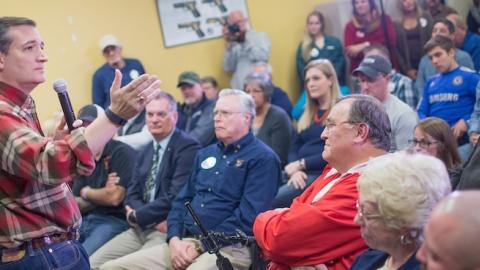In the aftermath of the 2012 election, conservatives/Republicans generally split into two camps about where the movement or party needed to head next. One camp thought the key was to do a better job of making the case for conservative principles and policies (and to do a better job of developing specific policies consistent with conservative principles), especially to Main Street Americans, many of whom are blue-collar voters.
This camp was particularly frustrated with Mitt Romney's failure to fight on the issue of Obamacare or to champion a conservative alternative to it, and it argued that Republicans couldn't win national elections without advancing a conservative message that would appeal to the old Reagan Democrats. It blamed the 2012 loss squarely on Romney's shoulders (and on the shoulders of those who failed to answer the bell and thus gave Romney an open path to the nomination).
A second camp maintained that Romney's defeat was the nearly unavoidable result of changing racial demographics, and it set out to pursue open-borders immigration "reform," more lenient criminal-sentencing policies, and the like, in an effort to try to negate, or at least to minimize, Democrats' success at playing racial-identity politics. Apart from these targeted efforts, which largely seemed designed to exonerate Romney and his allies, this camp showed little interest in changing the way Republicans do business.
As has been widely reported, Donald Trump's appeal has mostly been to blue-collar voters, and he has risen to the top of the polls by blasting open-border immigration policies and the business-as-usual way of Republican—and American—politics. It is therefore striking that the Iowa entrance polling suggests that Trump lost among blue-collar voters (or, more specifically, among voters without college degrees) to Ted Cruz.
According to entrance polling, among the roughly half of all Republican voters without a college degree, Cruz won 30 percent of the vote, eclipsing Trump's 28 percent. Marco Rubio was a distant third, winning the support of just 17 percent of voters without college degrees. Cruz did 5 points better among voters without college degrees than among college grads (30 percent to 25 percent), while, among all candidates included in the entrance polling (Cruz, Trump, Rubio, Ben Carson, Hillary Clinton, and Bernie Sanders), Rubio was the candidate who had the lowest portion of his support come from those without college degrees—he did 10 points worse among voters without college degrees than among college grads (17 to 27 percent).
According to the entrance polling, Cruz also fared better than Trump or Rubio among younger voters. Among voters under the age of 30, Cruz won 26 percent of the vote to Rubio's 23 percent and Trump's 20 percent. Among voters in their 30s and early 40s, Cruz won 30 percent of the vote to Trump's 23 percent and Rubio's 21 percent. (Meanwhile, on the Democratic side, Hillary Clinton got clobbered among younger voters, winning less than 30 percent of the vote among those under the age of 45.)
Cruz's strong numbers among blue-collar voters lend credence to his expressed determination, emphasized in his victory speech, to win Reagan Democrats back into the Republican fold. Cruz could certainly do more to appeal to such voters—for example, he could champion a winning Obamacare alternative, a move that would also help convince GOP primary voters that a Cruz nomination could result in an electoral win in 2016 and a huge policy win in 2017. Yet, even already, Cruz's appeal to blue-collar voters has helped him notch an impressive win in a crucial state.
















